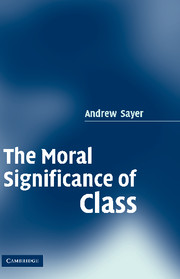Book contents
- Frontmatter
- Contents
- Preface and acknowledgements
- 1 Introduction
- 2 From the habitus to ethical dispositions
- 3 Recognition and distribution
- 4 Concepts of class: clearing the ground
- 5 Struggles of the social field
- 6 Moral and immoral sentiments and class
- 7 Responses to class I: egalitarianism, respect(ability), class pride and moral boundary drawing
- 8 Responses to class II: explanations, justifications and embarrassment
- 9 Conclusions and implications
- Bibliography
- Index
4 - Concepts of class: clearing the ground
Published online by Cambridge University Press: 22 September 2009
- Frontmatter
- Contents
- Preface and acknowledgements
- 1 Introduction
- 2 From the habitus to ethical dispositions
- 3 Recognition and distribution
- 4 Concepts of class: clearing the ground
- 5 Struggles of the social field
- 6 Moral and immoral sentiments and class
- 7 Responses to class I: egalitarianism, respect(ability), class pride and moral boundary drawing
- 8 Responses to class II: explanations, justifications and embarrassment
- 9 Conclusions and implications
- Bibliography
- Index
Summary
Introduction
The normative significance of class for actors depends partly on their understanding of what determines class. Thus the evaluations that they make of their class others and themselves are influenced by what they assume to be the causes of class positions; in particular they involve assessments of whether people ‘deserve’ their class position or are undeserving beneficiaries or victims of it. For example, as Michèle Lamont demonstrates, while US skilled working men tend to see class inequalities in individualistic terms, as products of differences in effort and merit, their French equivalents have a more politicised understanding of class as a structure or set of forces positioning people (Lamont, 2000). As with any kind of practical sense, lay understandings do not have to be consistent or correct: people often waver between treating class differences as unfair or fair, or deny that classes exist when their actions imply the opposite. We therefore cannot simply reduce class to whatever actors imagine it to be, for it may have effects on them that they do not register, including ones that influence the positions from which they think about class. In subsequent chapters, like Bourdieu and other social theorists, I shall mostly simply use the everyday descriptions ‘working class’ or ‘middle class’ for locating actors, qualifying them where necessary. However, it is important to appreciate what lies behind those everyday terms, and for this we need to turn to sociological theory, where we encounter more examined concepts of class.
- Type
- Chapter
- Information
- The Moral Significance of Class , pp. 70 - 94Publisher: Cambridge University PressPrint publication year: 2005



